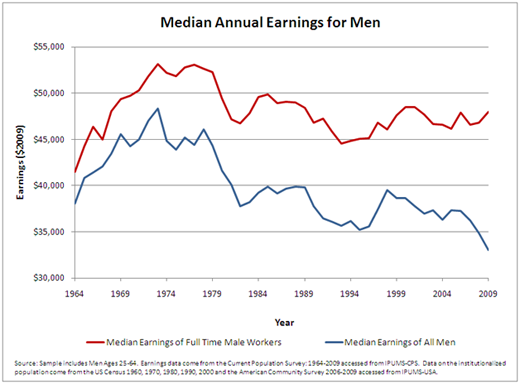I don't know how often I can make this point. Wages aren't rising and they're lower than they were in the 70s.
Should they be? Or is it equivalent pay for equivalent work?
We visited this a little in another thread, but I thought here might be a better place to discuss it.
Your chart take from a particular sub-section:
"Number of males 15+ with wage and salary income"
Charts that still show the year to year increases use:
"Number of males 15+ with earnings"
Here is an interesting insight, both of these subsections have gone down year to year as a percentage of males:
"Number of males with wage and salary income"
74% in 1967 to 64% 2017.
"Number of males with earnings"
80% in 1967 to 70% 2017.
The all inclusive group that has stay consistent all that time at 90%:
"Number of males 15+ with income"
Those in the category, wage and salaried earnings, have stayed relatively consistent in terms of median since 1970, because jobs of this nature haven't changed much since 1970. That said 12% less males relay on these for their incomes.
When you include nonwage/salaried earning(commissions and the like) and income without earning median still raises 13%, with these gains being in non wage/salaried earnings as seen by changes in the mean.
That means, if we distribute
all males into 4 income categories and contrast wage peak of 1972 and 2017, in 2017 dollars:
1972:
8% No income
31% under 25,000
47% 25,000-75,000
14% 75,000+:
2017:
10% No Income [Avg Schooling doubled / more seniors]
28% under 25,000
40% 25,000-75,000
22% 75,000+:
So basically your argument is circular as today the money is in commission and investment.
Males working full-time is down 13%. Part-time 11%. The fact despite this income for everyone is up seems to me a good thing, but than I think passive income is better than worked income.

